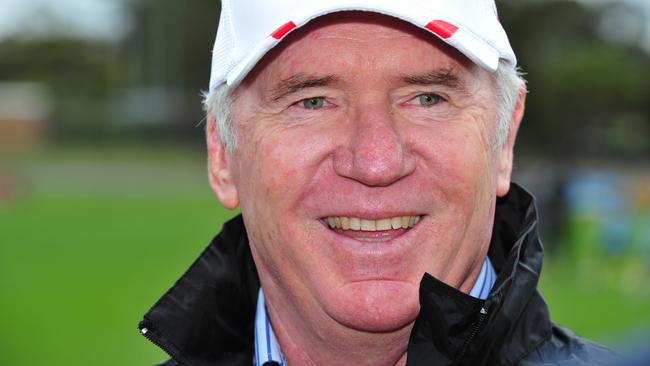Cricket Australia chose money over morality in Monkeygate, says Border
ALLAN Border says Cricket Australia choose money over morality in the infamous Monkeygate affair.

ALLAN Border says Cricket Australia abandoned its players, folding to the intemperate might of India and choosing money over morality in the infamous Monkeygate affair. The former Australian captain cites it as a reason for quitting the board.
Almost seven years after Harbhajan Singh was accused of racially abusing Andrew Symonds, the bitterness lingers. This week, Sachin Tendulkar launched an attack on the integrity of Ricky Ponting, Michael Clarke and Adam Gilchrist over the affair in his new autobiography.
Ponting, who was captain at the time, says he believes to this day that in standing by Symonds and reporting Harbhajan — as the sides had been instructed before the series in cases of racial abuse — he did the right thing by the player, the game and society.
“I thought we (the board) let the players down badly then,” Border told The Weekend Australian. “Australians have copped our brickbats over the years for being aggressive and in-your-face and playing that style of game that a lot of people didn’t like.
“We encouraged the players to clean the game up and report certain incidents but when they did report the alleged abuse, it turned 180 degrees. Andrew Symonds and Ricky Ponting were the ones who really copped it.
“Andrew was the victim of the abuse and Ricky is not the sort of bloke to run off and tittle-tattle but he figured enough was enough, and did what we had told him to do … both (were) pilloried for the stance they took.”
Harbhajan was suspended for three matches after the Sydney Test and the Indians were so enraged they threatened to go home unless the decision was overturned. It was denied at the time, but Tendulkar confirms the threat in his new book and says he drove it out of anger.
Cricket Australia scrambled to appease the Indians, aware that a falling out with the nation would decimate the revenue streams generated by playing the side from the subcontinent. A single day-night match against India earns Australia about $7 million income.
In a panic to appease its paymasters, Cricket Australia contrived with the BCCI to present an agreed set of facts at the appeal. Not only was Harbhajan let off, but judge John Hansen attacked Symonds for his approach to the game.
Border keeps the details of the boardroom conversations private but writes in his new book Cricket As I See It: “The backroom deals were done, and I was out of my depth. They made the commercial decision, not the ethical/moral decision.”
He says the board was told that “we’d have a massive financial hole if the Indians went home, and we couldn’t afford it”.
He says that now he has come to accept that maybe it was better to fight another day.
“As a board member, I was really disappointed but the initial agitation dies down when you start getting those commercial realities. What price do you put on these things? I quite like Harbhajan, I like the way he plays his cricket, but was he guilty? There wasn’t definitive evidence.
“I think the spiral downhill started for Andrew, his cricket started to fall away, he felt thoroughly let down and I suppose what price do you put on trying to do the right thing and backing your players and what would have happened?
“At the end of the day, it still sits uncomfortably with me, but I get it — sometimes you have to take a deep breath and assess what your fall-back position is, you don’t just head toward the abyss.”
Border writes the incident “hastened my departure from the board a little”.
The actions of the boards stunned Hansen, whose views were expressed in a book by former ICC chief executive Malcolm Speed.
“Although both boards would deny it, BCCI and CA were having discussions behind the scenes to resolve matters,” Hansen wrote. “Indeed, they presented me with an agreed statement of facts and a consent order that they expected me to rubber-stamp. In my view, the consequences of such a course of action would have been disastrous for cricket.
“In any event, their actions undermined the independence of the code of conduct commissioner, were unbecoming and, in my view, contrary to the spirit of cricket ... Given (that) the procedure arises from a voluntary code with input and agreement of all member associations, I consider the behaviour was improper ... having agreed to it, they ought to have confidence in it and respect it.”


